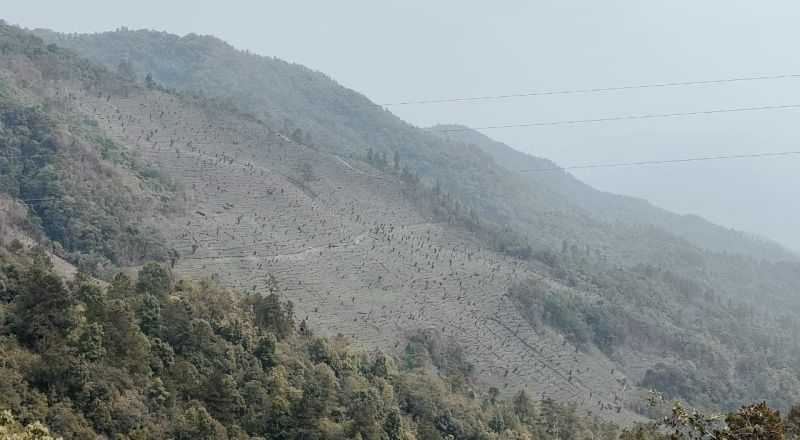The close affinity our forefathers shared with nature makes more sense with changes in climatic patterns posing a serious threat to agricultural production and destabilizing the livelihood of the farmers.
Taking a cue from its climate resilient nature, farmers in different areas of Ukhrul district, Manipur have planted millet crops which are not affected by climate changes. On the other hand, paddy has witnessed sharp decline in recent years; last year, paddy yield declined by 45 to 50 per cent causing immense hardships to the poor farmers.
67- year old K Shangam, a native of Chingjaroi village in remote north of Manipur’s Ukhrul district, is one of those who have taken up cultivating millet crops. Over the years, he has been sustaining his family on the little revenue that he generates from selling his agricultural products at his local market where the matter of supply and demand arithmetic never occurs.
For a farmer of his age, profit is nowhere in their mindset as they belong to a community where sharing is deeply rooted in their way of life.
Born and raised in a farming background, he enjoyed working with his parents doing different agricultural activities.
ALSO READ: Farmers in Manipur's Ukhrul district banking on climate resilient millets
For better or for worse, times have changed and so have people’s mindset. We have to embrace change and we cannot reverse the clock, K Shangam said while speaking exclusively to the Imphal Free Press on his decision to grow millet crops.
The decision to grow millet dawned following reports of a training and awareness programme initiated by the state Agriculture Department and Directorate of Environment and Climate Change, Government of Manipur; Shangam is one of the farmers banking on millet crops.
He exuded confidence that he would harvest not less than 50 tins worth millet crops. “I am planting this crop after a gap of one decade. In our days, over 90 per cent of the farmers used to grow this crop in addition to paddy and no farmers complained of starvation. Productivity and production was quite good with each farmer harvesting enough to last 3 to four years,” Shangam said.
 (PHOTO: IFP)
(PHOTO: IFP)
Though we have put up scarecrows, bird rampage is likely to increase as only a few farmers have planted these crops, he said while appealing to the concerned department to educate more farmers on the significance of millet crops.
He continued that there is a sharp decline in river current as the source from where it originates and its surrounding areas have reported declines in forest cover with each passing year and season.
If destruction of forest cover continues, a time will come, sooner than later, when mankind will die for their own folly, he cautioned.
A strong believer of man and environment sharing symbiotic relationship, he called for realistic forest policies prior to initiating any such programme in the state.
Grace Thumrah, another millet grower from Lunghar village under Ukhrul assembly constituency, said that the crop is growing in good condition. Unlike other vegetables and crops, millet crop, as rightly stated by experts, is indeed climate resilient, she said.
Farmers have completely stopped growing these crops in the last one decade not knowing its importance. However, given its health benefits and resilient nature, cultivators have decided to grow millet on a large scale in the years to come, Grace said.
Lunghar village is known for its large scale production of cabbage, beans and other green leafy vegetables.
Attacks by insects and armyworms, in particular. to the standing maize plants have begun yet again in different areas of the district. Reckless killing of birds using airguns and traps in the last decade has steadily begun to show its result with devastation in the fields and farms showing an upward trend.
A state scheme “Promotion of Millet” is initiated by the state government under the State Agriculture Department in the year 2023.
ALSO READ: Millet: The Supercrop in the Climate Change Scenario
The interventions include Cluster formation of farmers, farmers training programmes and exposure visits, accessibility to seeds, assistance for crop protection, capacity building on harvesting, etc, among others.
Apart from the State Agriculture Department, the Directorate of Environment and Climate Change, Government of Manipur has also undertaken awareness and training programmes for farmers on promotion of millets under climate resilient agriculture.
A scientist who is familiar with millet crops said that millets are “most suitable in tropical as well as sub-tropical”, up to an altitude of 2100 mts. It is a heat loving plant and for its germination the minimum temperature required is 8-100 degree Celsius. A mean temperature range of 27-290 degree Celsius during the growth period is best for proper development and good crop yield.
Millets are climate friendly as they can counter many of the adverse effects of climate change better than most other food crops. They grow in almost any type of soil, the scientist added.
Millets are small-grained, annual, all-season cereals which can be cultivated round the year, but best suited during the warm season, belonging to the grass family.
Millets are also called the nutri-cereals as they provide most of the nutrients required for normal functioning of the human body.
Millet is a climate resilient and dry land cereal. They have low requirements of water and fertility when compared to other popular cereals like paddy, maize and wheat. They are highly tolerant to drought and other extreme conditions.
It is also referred to as ‘smart food for the future’ with high calcium, Zn, Fe, low glycemic index and free gluten.
Job’s tear locally known as Ngum in Tangkhul dialect, Shorghum as Chanan in Manipuri and Sipaipa in Riangmei and Finger millet as Lan in Tangkhul dialect are grown in very small pockets of the state since many years back, the scientist added.
It may be mentioned that successful trials have been conducted by ICAR, Lamphelpat for Finger millet (Ragi), Pearl millet (Bajra) and Foxtail millets in Manipur.